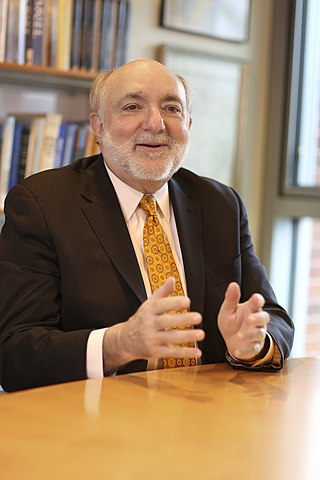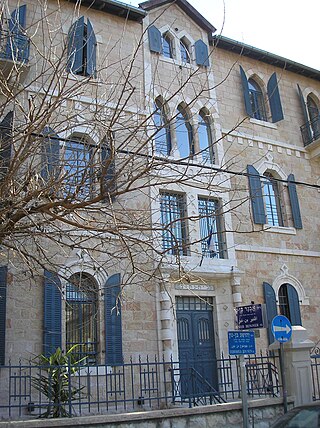
The Jewish Theological Seminary (JTS) is a Conservative Jewish education organization in New York City, New York. It is one of the academic and spiritual centers of Conservative Judaism and a center for academic scholarship in Jewish studies. The Jewish Theological Seminary Library is one of the most significant collections of Judaica in the world.
Religious pluralism is a set of religious world views that hold that one's religion is not the sole and exclusive source of truth, and thus recognizes that some level of truth and value exists in other religions. As such, religious pluralism goes beyond religious tolerance, which is the condition of peaceful existence between adherents of different religions or religious denominations.

Shlomo Riskin is an Orthodox rabbi, and the founding rabbi of Lincoln Square Synagogue on the Upper West Side of New York City, which he led for 20 years; founding chief rabbi of the Israeli settlement of Efrat in the Israeli-occupied West Bank; former dean of Manhattan Day School in New York City; and founder and Chancellor of the Ohr Torah Stone Institutions, a network of high schools, colleges, and graduate Programs in the United States and Israel.

Rabbinic authority in Judaism relates to the theological and communal authority attributed to rabbis and their pronouncements in matters of Jewish law. The extent of rabbinic authority differs by various Jewish groups and denominations throughout history.
Jewish feminism is a movement that seeks to make the religious, legal, and social status of Jewish women equal to that of Jewish men in Judaism. Feminist movements, with varying approaches and successes, have opened up within all major branches of the Jewish religion.

Avraham Haim Yosef (Avi) haCohen Weiss is an American Open Orthodox ordained rabbi, author, teacher, lecturer, and activist who led the Hebrew Institute of Riverdale in The Bronx, New York until 2015. He is the founder of Yeshivat Chovevei Torah for men and Yeshivat Maharat for women, rabbinical seminaries that are tied to Open Orthodoxy, a breakaway movement that Weiss originated, which is to the left of Modern Orthodox Judaism and to the right of Conservative Judaism. He is co-founder of the International Rabbinic Fellowship, a rabbinical association that is a liberal alternative to the Orthodox Rabbinical Council of America, and founder of the grassroots organization Coalition for Jewish Concerns – Amcha.

David Ellenson was an American rabbi and academic who was known as a leader of the Reform movement in Judaism. Ellenson was director of the Schusterman Center for Israel Studies and visiting professor of Near Eastern and Judaic studies at Brandeis University and previously president of the Hebrew Union College-Jewish Institute of Religion (HUC-JIR). He previously served as president of HUC-JIR from 2001 to December 31, 2013, and was later chancellor emeritus of that college until his death. Ellenson had served as interim president following the death of his successor, Aaron D. Panken until the inauguration of Andrew Rehfeld, the 10th and current President.

The Shalem Center was a Jerusalem research institute that supported academic work in the fields of philosophy, political theory, Jewish and Zionist history, Bible and Talmud, Middle East Studies, archaeology, economics, and strategic studies.
Siddur Sim Shalom refers to any siddur in a family of siddurim, Jewish prayerbooks, and related commentaries, published by the Rabbinical Assembly and the United Synagogue of Conservative Judaism.

David Hanoch Yitzchak Bar-Hayim is an Israeli rabbi who heads the Shilo Institute, a Jerusalem-based rabbinical court and institute of Jewish education dedicated to the Torah of Israel.
Not in Heaven is a phrase found in a Biblical verse, Deuteronomy 30:12, which encompasses the passage's theme, and takes on additional significance in rabbinic Judaism.
Reuven Hammer was an American-Israeli Conservative rabbi, scholar of Jewish liturgy, author and lecturer who was born in New York. He was a founder of the "Masorti" (Conservative) movement in Israel and a president of the International Rabbinical Assembly. He served many years as head of the Masorti Beth Din in Israel. A prolific writer in both the Israeli and international press, he was a regular columnist for The Jerusalem Post's "Tradition Today" column. He lived in Jerusalem.

Daniel Landes is the former director of the Pardes Institute of Jewish Studies in Jerusalem and New York City.
Jill Jacobs is an American Conservative rabbi who serves as the executive director of T'ruah: The Rabbinic Call for Human Rights, formerly Rabbis for Human Rights-North America. She is the author of Where Justice Dwells: A Hands-On Guide to Doing Social Justice in Your Jewish Community and There Shall be No Needy: Pursuing Social Justice through Jewish Law and Tradition. This book includes chapters on tzedakah, poverty, health care, housing, labor, criminal justice, and environmental justice in America, seen through a Jewish viewpoint. She has served as the Rabbi in Residence of Jewish Funds for Justice and as the Director of Outreach and Education for Jewish Council on Urban Affairs.
The first openly lesbian, gay, bisexual, and transgender clergy in Judaism were ordained as rabbis and/or cantors in the second half of the 20th century.

Menachem Kellner is an American-Israeli academic and Jewish scholar of medieval Jewish philosophy with a particular focus on the philosophy of Maimonides. He is a retired Professor of Jewish Thought at the University of Haifa and is the founding chair of the Department of Philosophy and Jewish Thought at Shalem College in Jerusalem. He has taught courses in philosophy, religious studies, medieval and modern Jewish philosophy at Washington University in St. Louis, the College of William & Mary, the University of Virginia, and the University of Haifa. He is probably best known for his book Must A Jew Believe Anything?, which was a Koret Jewish Book Award finalist.

Shalem College is a private liberal arts college in Jerusalem, Israel providing undergraduate education and founded with the aim of producing "broadly educated citizens for lives of influence and service." It is the only Israeli institution of higher education to offer a broad-based Core Curriculum as the basis for a first degree, as opposed to the general practice in Israeli universities and colleges of restricting a student's courses to a single department or field.
Od Yosef Chai, also known as Od Yosef Hai is a yeshiva situated in the West Bank settlement of Yitzhar. Od Yosef Chai includes several related institutions; a yeshiva high school, a yeshiva gedola, a kollel and the publishing house that released "The King's Torah", and other materials.
Yeshivat Maharat is a fringe and controversial Jewish educational institution in The Bronx, New York, which is the first Orthodox yeshiva in North America to ordain women. The word Maharat is a Hebrew acronym for phrase manhiga hilkhatit rukhanit Toranit, denoting a female "leader of Jewish law spirituality and Torah". Semikha is awarded to graduates after a 3- or 4-year-long program composed of intensive studies of Jewish law, Talmud, Torah, Jewish thought, leadership training, and pastoral counseling. The ordination functions as a credentialed pathway for women in the Jewish community to serve as clergy members.
This is a timeline of LGBT Jewish history, which consists of events at the intersection of Judaism and queer people.










